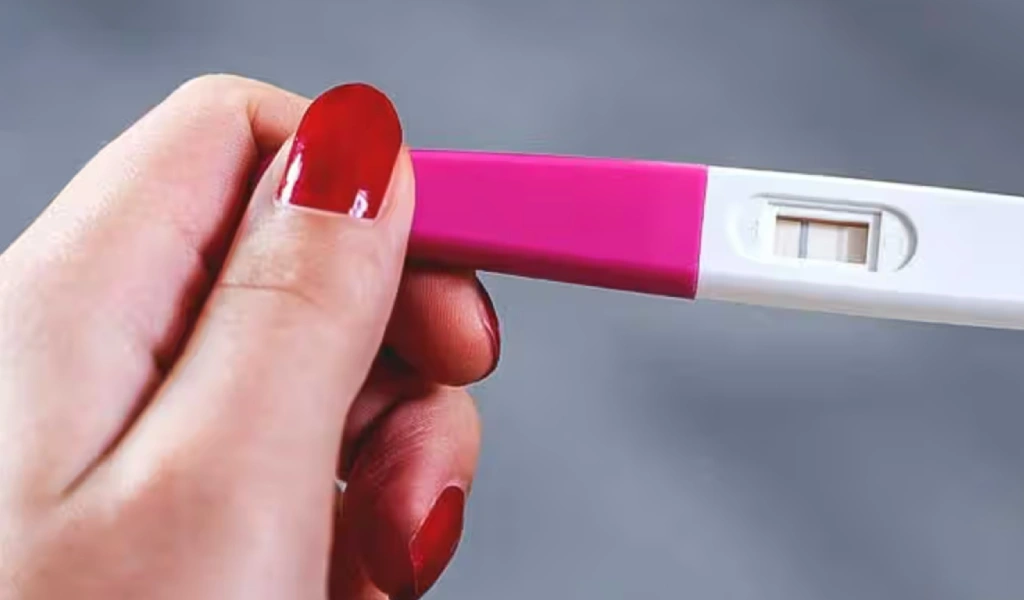It is recommended to take a pregnancy test in the morning, ideally waiting at least one day after you have missed your period.
If you are attempting to get pregnant and have missed your period, you may be unsure about when to do a pregnancy test. This article ‘When Is The Right Time To Take A Pregnancy Test?‘ will provide more information on this topic. When you are hoping to get pregnant, a missed period can be a cause for optimism.1
However, taking a home pregnancy test right away may not provide reliable results, particularly if you have irregular or missed periods. Keep reading to find out the correct timing for taking a pregnancy test when trying to get pregnant.
What exactly is a pregnancy test?
Pregnancy tests are created to indicate the presence of human chorionic gonadotrophin (hCG) hormone in urine, which is released immediately after the fertilized egg is implanted in the uterine lining and increases in concentration every two to three days.2
You can take a pregnancy test at home or in a clinic. There are different pregnancy kits you can buy at pharmacies for doing a home pregnancy test. It’s important to follow the instructions in the pregnancy kit carefully when doing a pregnancy test at home.
If you are visiting an OB-GYN, they will administer a blood pregnancy test which is considered to be more precise than a urine pregnancy test.
What is the optimal time for taking a pregnancy test?
Not sure about the right time to take a pregnancy test? You can do the pregnancy test right when you miss your period. In some cases, a pregnancy test can even be done a few days before the expected period date. As previously stated, the pregnancy test checks for the hCG hormone that is present during pregnancy. Your body might start producing this hormone even before your expected period date.
It is not recommended to take a pregnancy test in the days leading up to a missed period as it may provide unreliable results. Even if the pregnancy test indicates a positive result, it does not guarantee that a pregnancy will be viable due to the possibility of a spontaneous miscarriage.
Therefore, it is advised to wait until the initial day of your period is missed.
When do pregnancy tests provide reliable results?
Home pregnancy tests are effective in detecting pregnancy with a 99% accuracy rate when taken on the first day after a missed period. It is recommended to take the pregnancy test in the morning as urine is more concentrated during that time, increasing the chances of an accurate result.
The outcome of the pregnancy test may not be accurate if you conduct the test too soon in the menstrual cycle, fail to use it correctly, or if the pregnancy kit is expired.
The precision of the at-home pregnancy test relies on the subsequent elements.
- How you adhere to the guidelines.
- When is the earliest you can perform a pregnancy test?
- When ovulation occurs and the duration of time it takes for implantation to happen.
- A pregnancy test can be done at any time, but it is recommended to wait until after missing a period for the most accurate results. It can still give reliable results even if taken a few days after conception.
What is the ideal time to take a pregnancy test and what are the early symptoms to look out for?
Before taking a home pregnancy test, you can look for certain signs to determine if you may be pregnant instead of being concerned about it. Some of the initial symptoms of pregnancy include.
- Detection of light bleeding or spotting occurs as a result of the embryo attaching itself to the uterine wall.2
- Experiencing discomfort or an unusual sensation of tension in the abdomen.
- Your breasts may become tender or swollen. You may experience pain and sensitivity when touching them or wearing a bra.3
- Feeling fatigued. You may become incredibly tired for no clear reason.
- An increased ability to detect odors.
- A sudden shift in eating patterns can lead you to either explore new foods that you previously disliked or lose interest in foods that you once enjoyed eating.
- Unpleasant flavor in the oral cavity.
During the first week to ten days after ovulation, you might notice the signs of pregnancy mentioned. If you’re not sure of the exact ovulation date but experience any of these symptoms, it’s recommended to take a pregnancy test right away.
Before undergoing the pregnancy test, it is important to be aware of the different kinds of pregnancy tests that are accessible and the earliest point at which pregnancy can be identified.
Urine Pregnancy Test
These pregnancy tests can be conducted in the convenience of your own home or office at a time that suits you. They offer the most convenient and private testing options. If you have been sexually active during your fertile period, you can perform the pregnancy test one week after you have missed your period.
The home testing kits are accompanied by guidelines that must be adhered to to obtain the most precise outcomes. After conducting the pregnancy test, you may consult your doctor about the findings. Your doctor will conduct more sensitive examinations to assess your pregnancy status.
Anticipated duration for the pregnancy test to yield results?
The outcome can be viewed between five to ten minutes. It is advised to disregard any results observed after the ten-minute mark as they may not be accurate. Similarly, viewing the results before the five-minute mark can also lead to inaccuracies.
What is the appearance of a positive pregnancy test?
If the test is positive, you will see two lines on the test strip – one control line that is always there, and a second line that appears after the urine has passed through.
Some tests come with two separate windows, and if the result is positive, lines will appear in both windows. Other kits feature a cross-design to indicate a positive pregnancy outcome.
Sometimes, even if you are not pregnant, you may receive a positive result. This occurrence is known as a false-positive result, which can be caused by the following reasons:
- Blood or protein may be present in your urine.
- You are currently taking drugs such as anticonvulsants, tranquilizers, and hypnotics.
- During the peak of luteinizing hormone (LH), hCG can be secreted from the pituitary gland.
- Large percentages of pregnancies that occur early on are likely to end in miscarriage before the next menstrual cycle. By administering a test very soon after conception, there is a possibility of identifying a false positive result for pregnancy.
- Women in their perimenopausal stage might have increased levels of the hCG hormone.
- Individuals receiving infertility treatment may experience an incorrect positive outcome if they conduct a test within ten days following the previous hCG therapy.
What does a negative pregnancy test appear as?
If the test result comes back as negative, the kit will show only the control line, with no other lines appearing. You may want to consider retesting in approximately a week to verify the results.
In certain situations, a negative test result may not rule out pregnancy. This occurrence is known as a false-negative result and can occur for the following reasons:
- The test kit has surpassed its expiration date.
- The directions were not followed accurately by you.
- If the urine specimen has been left for an extended period, such as 30 minutes or longer, it may provide an incorrect negative result.
- You are conducting a test in the early stages when there is not enough hCG being produced.
- If you have consumed a significant amount of liquids right before the test, your urine may appear to be very diluted.
- If you are taking any medications like antihistamines or diuretics.
What is the meaning of a faint line appearing on a pregnancy test?
At times, a faint line on a pregnancy test can suggest a low level of hCG hormone in the urine. This faint line typically occurs in early pregnancy when the hormone concentration is still low. Conversely, a darker line may appear if the pregnancy has progressed and the hormone concentration is higher.
Pregnancy can be confirmed through blood tests
The blood test can be conducted at a medical facility or your doctor’s office. Nevertheless, they are not as popular as urine tests.
One benefit is that pregnancy can be detected early through blood tests, sometimes as soon as six to eight days after ovulation. Nevertheless, these tests require more time to yield results.
Your physician will choose from either of the two options for blood tests.
- Qualitative hCG test: A blood sample will be analyzed for any presence of hCG to determine your pregnancy status. Your doctor may suggest this test around ten days following a missed period. The qualitative hCG test can identify hCG levels at an even earlier stage.
- Quantitative hCG test (beta-hCG): It quantifies the precise level of hCG present in the blood sample, allowing for the detection of minimal amounts of the hormone in the initial phases of pregnancy. It evaluates the concentration and monitors potential complications during pregnancy.
The pregnancy test is often utilized in conjunction with other tests to eliminate the chance of an ectopic or tubal pregnancy, as well as to monitor the body’s response after a miscarriage when hCG levels decrease quickly.
Home pregnancy tests offer a convenient and efficient method for determining pregnancy and are essential for family planning. However, they can occasionally provide incorrect results, either positive or negative. It is recommended to seek advice from a healthcare professional and undergo clinical tests for precise outcomes. When attempting to get pregnant, it is crucial to maintain good self-care and prepare your body for the changes ahead.
Key Pointers of ‘When Is The Right Time To Take A Pregnancy Test’
- Pregnancy tests have a 99% accuracy rate in detecting Human chorionic gonadotropin (hCG) in the urine.
- hCG is produced after the embryo implants itself, and morning urine is recommended for the most accurate results.
- For dependable results, it is recommended to test at least one week after a missed period.
- Various test kits may have different symbols to indicate a positive result, such as two lines or a cross pattern.



























